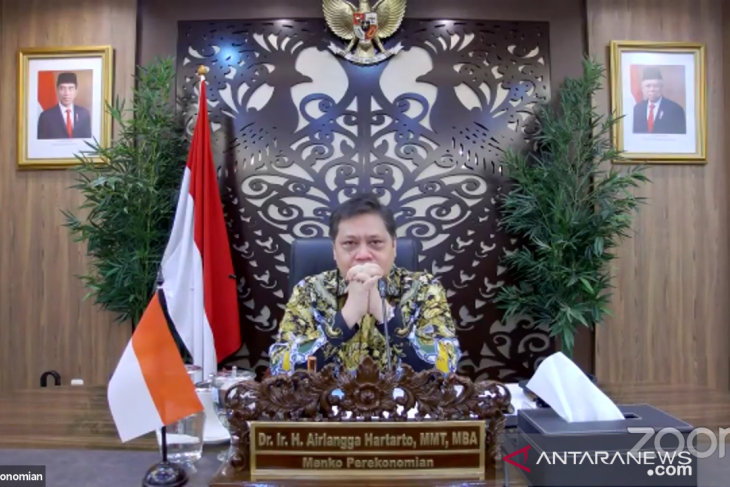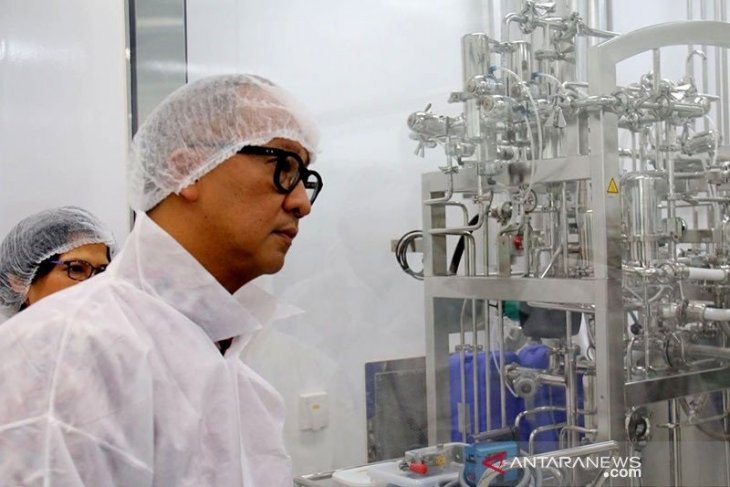Live Streaming
Program Highlight
Company Profile

Ani Hasanah
June

Coordinating Minister for Economic Affairs, Airlangga Hartarto, at a webinar on MSME adaptations in the new normal, in Jakarta on Friday (June 19, 2020). (ANTARA/Dewa Wiguna/ac)
More than 300 thousand micro, small, and medium enterprises (MSMEs) in Indonesia made the shift to digital platforms in wake of the coronavirus pandemic, according to the Coordinating Ministry for Economic Affairs.
Between May 14, 2020 and June 9, 2020, as many as 301,115 micro, small, and medium enterprises underwent a digital transformation, said Coordinating Minister for Economic Affairs, Airlangga Hartarto, at a webinar on MSME adaptations in the new normal, in Jakarta on Friday.
The Coordinating Minister urged other MSMEs to take advantage of the momentum to increase their market penetration, as there has been a substantial shift in the market's consumption pattern from conventional to digital platforms.
He revealed the sectors of business that have surged significantly online include household needs, which has shown a 400-percent increase, followed by beauty products, which has grown by 80 percent, fashion (40 percent), and delivery services, which have seen a 35-percent jump.
The potential value of the digital economy is predicted to be higher this year at around US$35 billion and is projected to reach US$101 billion in 2025.
According to the Ministry of Cooperatives and Small and Medium Enterprises (SMEs), there were 64.1 million SMEs in Indonesia, as of the first half of 2019.
As many as 63.3 million, or 98.6 percent, of the total SMEs operated micro-businesses, while the rest were medium-business operators (1.2 percent) and medium enterprises (0.09 percent).
Of the 64.2 million MSME actors, only 13 percent, or around 8.3 million, MSMEs have utilized digitalization in running their businesses. (ANTARA)
The Task Force for Acceleration of COVID-19 Handling highlighted the notable progress clocked in handling the pandemic in the country in the past three months.
"The number of cases has increased, but the figure is still lower than the projections. Several parties projected that the number of cases might reach hundreds to even thousands, but it did not occur until now," Head of the Task Force's expert team, Wiku Adisasmito, noted during a discussion in Jakarta on Friday.
The number of deaths caused by the virus has declined, with the mortality rate dipping, from 10 percent to five percent, while the rate of recovery has risen to almost 40 percent.
"If we see the situation now, in fact, it has been relatively under control," he asserted.
Adisasmito strongly believes that Indonesia is on the right track in terms of handling COVID-19, as public awareness of the risk of the disease has increased and implementation of health protocols has improved.
Echoing the same opinion, head of the Army Health Center (PUSKESAD) Maj. Gen Tugas Ratmono remarked that the bed occupancy (BO) rate at the Gatot Soebroto military hospital (RSPAD), a referral hospital for COVID-19 handling, for severely symptomatic COVID-19 patients had declined.
"Currently, doctors at RSPAD are not as busy as earlier. The BO (Bed Occupancy) rate was only 40 percent," he stated.
This indicates a decline in the number of cases of patients with severe symptoms at the hospital, he added. (ANTARA)
June
Basic Metal, Food Industries Remain Leading Sectors in Exports: Government

Industry Minister Agus Gumiwang Kartasasmita. ANTARA/HO-Industry Ministry/sh
Basic metal and food industries are projected to continue to be the leading sectors for Indonesian exports, as they have contributed significantly to the country's revenue amid the COVID-19 crisis.
"The metal industry's positive record has demonstrated that the downstreaming policy has run well. It could increase the added value of domestic raw material and meet the demand of the international market," Industry Minister Agus Gumiwang Kartasasmita stated here on Friday.
The Central Bureau of Statistics (BPS) recorded that during the initial five months of the year, non-oil and gas processing industry exports crossed US$51 billion, thereby contributing 79.25 percent to the country's total exports at $64.4 billion.
"We are committed to boosting the export-oriented industry to bolster the national economy," the minister noted.
Among the industries is the base metal industry that registered a 41-percent increase in exports during the period from January to May 2020 to reach $9.2 billion, from $6.5 billion worth of exports during the corresponding period of 2019.
In the same way, food industry exports during the period rose by eight percent to touch $11.4 billion, from $10.5 billion of exports in 2019.
"We have set a target for our food and beverage industries to dominate the Southeast Asian market in line with the roadmap of Making Indonesia 4.0," he stated.
Other manufacturing sectors to have significantly contributed to the country's exports comprise the chemical and chemical goods industry, with $4.9 billion of exports, followed by the garment industry, $2.8 billion; computer, electronic goods, and optics, $2.4 billion; and leather, leather goods, and footwear, $2.3 billion.
"In terms of the chemical industry, we have targeted to become a leading player in the biochemical industry, whereas, for the textile and garment industry, the government has focused on functional clothing," he revealed.
Computers, electronic goods, and optic industry exports increased by 14 percent, from $2.1 billion of exports during the corresponding period in 2019. The government is channeling attention on the domestic market for the sector, Kartasasmita explained.
"We are optimistic that by 2030, Indonesia would be part of the world’s 10 largest economies by seriously developing the export-oriented sector," he asserted.
Kartasasmita expressed a belief that the manufacturing industry would forge ahead at a swifter pace after the COVID-19 crisis is overcome, as the operational license has been issued for the strategic industry, with stringent adherence to health protocols.
"There should be no wide gap in productivity, and we should not lag behind. After the vaccine for COVID-19 is found, it would not take long for the manufacturing industry to rebound," he pointed out. (ANTARA)
Belarusian Automobile Engineering Company BelAZ Named Indonesia one of its Most Important Partners
The Belarusian automobile engineering company, BelAZ, is one of the world's main manufacturers of heavy-duty trucks. It is one of the flagship companies in Belarus, which is always under close attention to the state. About 95% of products are exported. According to the Press Release of Belarus Embassy received by Voice of Indonesia in Jakarta, Friday (19.06), BelAZ is particularly interested in Asia and Latin America. For the last five years, Indonesia has consistently been one of the top three largest markets for mining equipment. Over the past four years, BelAZ has shipped more than 50 vehicles with a carrying capacity of 110-130t to Indonesia.
Today BelAZ pays great attention to the development of interesting new products. The company has been working on robotization for many years. BelAZ sold the first few unmanned 130-tonne haul trucks to Russia's Siberian Coal Energy Company SUEK. They are undergoing tests in Russia's Khakassia. In 2020, BelAZ intends to demonstrate its robotic complex in Belarus. The company plans to send there a 90-tonne haul truck and a remotely operated loader.
Another interesting direction is electric dump trucks. BelAZ has designed a diesel trolley truck, an electric trolley truck, and an electric dump truck. The diesel trolley truck and the electric trolley truck use a certain amount of external electricity fed by trolley lines. BelAZ expects the increasing interest towards its new products, especially among South-East Asian countries. (Release Embassy of Belarus)



